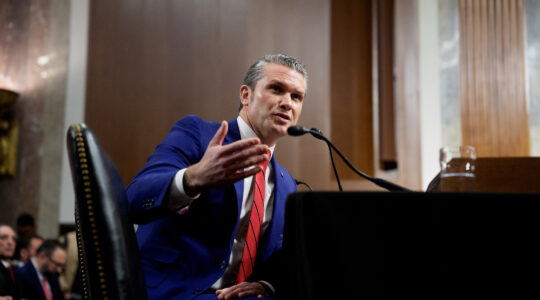Jewish Agency insiders in the United States are using the term "catastrophic" to describe the recent controversy over a Hebrew-language television advertisement that ran in Israel only to be withdrawn by the organization after some Diaspora Jews called it offensive.
The ad, which featured dark skies, foreboding trains and missing persons signs bearing the names and pictures of assimilated Jews, was meant to galvanize the Israeli public behind MASA, which gives scholarships to non-Israeli Jews to attend extended-stay programs in Israel. The government and the Jewish Agency each pay half of the organization’s $39 million budget.
According to insiders, MASA and the Jewish Agency desperately want to change the split, with the hope that the Israeli government will pick up 75 percent of the tab. The agency simply cannot afford the current bill following budget cuts totaling nearly $100 million over the past two years.
The thinking behind the ad, the insiders say, was to create brand recognition for the program much like that of Birthright Israel. At one point, Birthright was unknown in Israel and had trouble receiving government funding. MASA officials hoped they could push the government for more money if the populace saw the program as a necessary entity.
Some of the Jewish Agency’s American lay leaders initially stood behind the ad, figuring that although it was provocative, it spoke to an Israeli audience that they simply did not understand — much like earlier MASA ads featuring overt sexuality spoke to a younger audience that they did not understand.
That is until they saw the price tag for the Israeli ad — some $850,000, according to one high-up insider.
"They have done several edgy ads. They made some uncomfortable, but as a marketer, I would say, ‘Bait the hook for the fish, not the fisherman,’ " the insider said, adding later that "I saw this ad and said this is edgy, and I got a couple of complaints, but I defended it. Now comes the fact that they spent $850,000, and I stopped being defensive and said, ‘Are you f-ing kidding me? They are spending that kind of money for tertiary referral business?’ If you are talking to a secondary referral base, this can’t be more than 10 percent of your marketing budget. This is a horrendous expenditure."
The incident most likely will put the issue of closer oversight of MASA on the agenda for the agency’s next board of governors meetings, the insider said.
The Heschel School’s big grant: The Heschel School, a pluralistic day school in Manhattan, announced this week that it had received $75 million in gifts as part of a $100 million campaign to improve the school.
Fertilizer magnate Ronald Stanton, who several years ago gave $100 million to Yeshiva University, made the lead gift of $33 million. Eight other philanthropists committed $42 million to the Heschel project, which will include building a 130,000 square foot K-8 building adjacent to its high school, according to The New York Jewish Week.
JTA has documented Jewish history in real-time for over a century. Keep our journalism strong by joining us in supporting independent, award-winning reporting.





